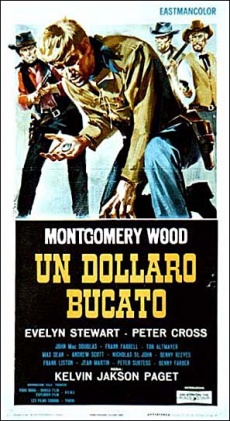One Silver Dollar review
One Silver Dollar
1965
Dir: Giorgio Ferroni
When the Civil War is over, Confederate officers Gary (Giuliano Gemma) and Phil O'Hara are released from a POW camp; Gary returns home to his wife Judy (Evelyn Stewart) while Phil heads off West. But Gary soon finds out that it's very hard to settle down and make a living in the post-war society, especially for a southerner, so he follows his brother to a town called Yellowstone in order to find work. he is soon hired by local banker McCorey (Pierre Cressoy), who offers him a ranch and some money in exchange for a 'dirty job': Gary must bring in a local bandit called Blacky, who has interfered with McCorey's affairs. Too late Gary recognizes his brother and when Phil pulls his gun, McCorey's men immediately open fire. Both brothers are left for dead, but Gary's life has been saved by a silver bullet he had in his breast pocket ...
Along with Duccio Tessari's The Return of Ringo (ritorno di Ringo, Il) (also with Gemma), Un dollaro bucato set the tone for the subgenre of the so-called Ulysses type. Usually set in the aftermath of the Civil War, the films are concerned with the trouble war veterans meet with when they try to pick up their lives. Most of the time the protagonist is a southerner, defeated but unbroken, who must fight for his land and family. With WW II and Mussolini still in mind, most Italian moviegoers had little trouble to identify with this kind of 'tormented hero'. In One Silver Dollar the feelings of defeat and humiliation, strongly felt by the common Italian, are symbolized by the sawn-off barrel of the pistol handed over to Gemma when he's released from the POW camp. The scene is echoed in the film's final moments, when this 'emasculated gun' is passed to Cressoy, who's unable to shoot Gemma with it, symbolizing not only Gemma's victory over the forces of evil, but also the regained fertility of the post-war society. Note that it's not Gemma who finally settles the scores with Cressoy, but the town's people.
Unlike most of his colleagues, Ferroni (born in 1908) was approaching middle age when the spaghetti craze broke out. He was brought up with Hollywood westerns and had a life as a director of B-movies behind him. Instead of an avenger consumed by hate, Gemma's character here is closer to the traditional Hollywood hero who comes to the aid of threatened homesteaders. To underline this idea, he wears buckskin, as if he were a descendant of Shane. Ferroni's westerns lack the characteristic ritual approach to violence, but he was an excellent storyteller with a good sense of style. Some scenes, such as the fatal confrontation of the two brothers, aren't very believable (they would've recognized each other immediately), but they're executed so well you don't really mind. Nearly every opportunity is taken to create a showcase for the physical abilities of former stuntman Gemma, resulting in a series of excellently staged fistfights and sudden shoot outs. It's in this aspect that the film works best. Even the idea of the saving dollar (an element taken from medieval tales of chivalry) is well-integrated in the story. Unfortunately some other narrative elements do not work so well. The main drawback here, is the romantic subplot. Un dollaro bucato is a film of a rather serious nature, so the often used light-hearted approach of the oddball comedies of the previous decade, the telefoni bianchi, would have been inapproriate, but that's hardly an excuse for a romance in the worst possible tradition of Hollywood schmaltz, making an irritating damsel in distress of the normally deliciously wicked Evelyn Stewart: "Gary, oh Gary". Like the life saving object, this Judy O'Hara seems to originate in some kind of medieval tale.
Shot for most part in the woody surroundings of Manziana, some thirty kilometers ouside the boundaries of Rome, this is a remarkably green spaghetti western. Gianni Ferrio's score is lovely, the whistled motto, played over the nice Rotoscope title sequence, a standout. Un dollaro bucato was an important movie for the Italian film industry; its success convinced producers that Italian westerns could be made without expensive American B-actors; furthermore the Ulysses formula of the war veteran returning home, would prove to be one of the most enduring formulas of the genre: some of the best latter day spaghetti westerns, like California and Keoma were cast in that mould. Reportedly it was one of the favourite films of famous Italian writer Alberto Moravia.
--By Scherpschutter




